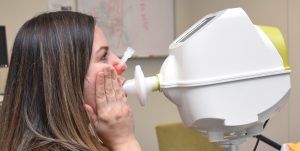
The soundwave-based device uses the forced oscillation technique
A device which uses sound waves to detect lung function is hoped to give people with asthma a new way to self-monitor at home, predict flare-ups and stay out of hospital.
The cloud-based device being trialled by the Woolcock Institute of Medical Research in Sydney uses gentle sound waves to probe the lungs as patients breathe with the data automatically uploaded to a cloud.
Researchers will then compare the daily report to the patient’s average symptoms, monitoring for changes that suggest increased risk of a flare-up.
The breathing test takes around two minutes and gives vital information about the person’s quality of life and whether a flare-up in symptoms might be on the horizon, said the study’s chief investigator Dr Cindy Thamrin, who co-leads the Airway Physiology Group at the Institute.
“People with asthma currently have no good tool to alert them to worsening symptoms,” she said.
“Just like the finger prick test changed life for diabetics, our technology has the potential to revolutionise respiratory care by ensuring people know what is happening to their condition and how to keep them themselves safe.
During the trial the data will be sent to researchers, but in the long term the team hopes to determined the right algorithm to predict the risk of a flare-up, which can be incorporated into an app which patients can use to self-manage, Dr Thamrin told the limbic.
“We hope to be able to identify the trigger point for when an increase in medication is required or a visit to their GP,” Dr Thamrin says. “In future, either the patient or the GP will receive an alarm if their breathing data suggest they’re about to have a flare-up.”
The challenge for the researchers will be maximising detection while minimising false alarms, she said.
Dr Thamrin, working with engineers in Milan, Italy, is recruiting asthma patients in Sydney who will have their conditions monitored with daily at-home tests over six months.
Volunteers must be aged over 18, have diagnosed asthma and currently treated regularly with preventer medication.